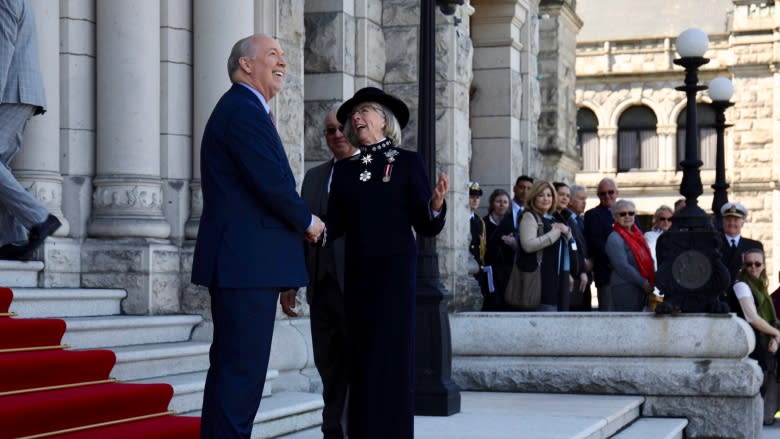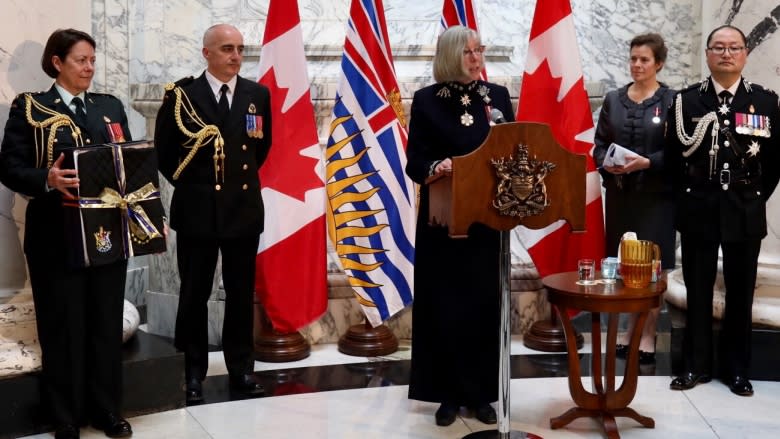Judith Guichon says goodbye as B.C.'s lieutenant governor
British Columbia's 29th lieutenant-governor ended her tenure as the Crown's representative with a bit of humour over the decision she will forever be known for.
"I have spoken to many folks from the media, all of whom are anxious for some special tidbit ... regarding what most regard as the most memorable moment during my tenure," said Judith Guichon, in a goodbye ceremony at the B.C. Legislature on Monday.
"As I have told these newshounds, if asked what my top three memories are, that day in June would not pop into mind as one of them.
"Sorry, Premier Horgan," she added to laughs.
Guichon, who is being succeeded by Metro Vancouver YWCA CEO Janet Austin on Tuesday, also spoke in her farewell speech about her experience travelling the province, her desire to bridge urban and rural communities and the need for scientists to find solutions to climate change.
But her one remark about the choice to ask Horgan to form government on June 29, 2017 made clear what she will long be cited for.
Reinforced convention
Guichon was asked that day by then-premier Christy Clark to dissolve the legislature and call another election, following her government's loss of a confidence vote after May's provincial election.
Clark's request was denied by Guichon, who then asked Horgan — who was supported by one more MLA than Clark, thanks to the endorsement of three Green Party MLAs — to see if he could gain the confidence of the house.
"The decision made reinforces some pretty well established convention, but conventions which always can be tested, and always the subject of debate when they come into play, namely when the lieutenant-governor can refuse the advice of a premier when it comes to dissolution," said Philippe Lagassé, a Carleton University professor who specializes in Canada's Westminster parliamentary system of government.
"It further cements the idea that if there is another viable government in the wings and a certain amount of time hasn't passed since an election, that a lieutenant-governor will grant another party the opportunity to form government before accepting a dissolution."
Guichon said the decision wasn't easy.
"It was a difficult time. It was concentrated, but we had access to a lot of good information and advice, both solicited and unsolicited."
Back to the Nicola Valley
Other than those straightforward remarks, Guichon has opted against revealing too many details of her decision, including who advised her — something Lagassé is hopeful will change in the future.
"At the end of the day, these conventions are the subject of some debate in some cases, and, therefore, I think the public and scholars would benefit from knowing who these people were and what their perspective of the question might have been," he said.
But, so far, Guichon has chosen to be reticent about her choice.
"I don't really have time to sit and reflect on that decision because I've been very busy ... I didn't have a lot of time to sit and reflect. I'll do that in the future when I put my feet up back home," she said.
Though how much time she'll have her feet up is an open question. A cattle rancher in the Nicola Valley by trade, Guichon was given a saddle as a parting gift at her ceremony — which may be used for more than ceremonial purposes.
"I wasn't quite sure what I was getting into in 2012," she joked.
"It was all very new and quite different from chasing cows."
With files from Megan Thomas and All Points West



